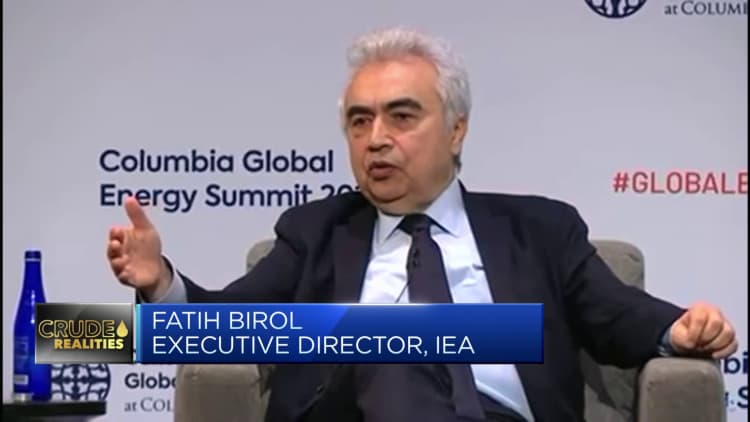[ad_1]
OPEC Secretary General Haitham Al Ghais said finger-pointing and misrepresenting the actions of OPEC and OPEC+ was “counterproductive.”
Anton Petrus | Moment | Getty Images
Oil producer group OPEC on Thursday lashed out at the International Energy Agency, saying the world’s leading energy authority should be “very careful” about undermining industry investments.
OPEC Secretary General Haitham al-Ghais said finger-pointing and misrepresenting the actions of OPEC and OPEC+ was “counterproductive.” He added that the influential group of 23 oil-exporting exporting nations was not targeting oil prices, but instead focusing on market fundamentals.
OPEC said that its comments came in response to fresh criticism from the IEA, without providing further details.
In a Bloomberg TV interview on Wednesday, IEA Executive Director Fatih Birol used similar language in warning OPEC about boosting oil prices.
Birol said that the energy alliance, led by Saudi Arabia, should be “very careful” with its production policy, warning that the group’s short-term and medium-term interests appeared to be contradictory. He added that higher crude prices and upward inflationary pressures would result in a weaker global economy, with low-income nations likely to be disproportionately affected.
“The IEA knows very well that there are a confluence of factors that impact markets. The knock-on effects of COVID-19, monetary policies, stock movements, algorithm trading, commodity trading advisors and SPR releases (coordinated or uncoordinated), geopolitics, to name a few,” Al-Ghais said.
Blaming oil for higher inflation was “erroneous and technically incorrect as there are many other factors causing inflation,” he added.
Surprise output cuts
Earlier this month, the Paris-based energy agency said surprise oil output cuts from OPEC+ risked exacerbating a projected supply deficit and could scupper an economic recovery.
Several OPEC+ members announced on April 2 that they were set to tighten global production by an additional 1.16 million barrels per day until the end of the year.
The decision, which the White House criticized, was said to have been made as part of an independent initiative unlinked to broader OPEC+ policy.

The cuts add to Russia’s existing plans to trim 500,000 barrels per day of its production from March until at least the end of the year. It means the combined voluntary cuts of OPEC+ members will be in excess of 1.6 million barrels per day.
“Other energy markets have been far more volatile,” al-Ghais said, “with oil markets less so, mainly due to the stabilizing role of OPEC and the OPEC+ group.”
“If anything will lead to future volatility” he added, “it is the IEA’s repeated calls to stop investing in oil, knowing that all data-driven outlooks envisage the need for more of this precious commodity to fuel global economic growth and prosperity in the decades to come, especially in the developing world.”
Fraught relationship
The relationship between OPEC and the IEA has been increasingly fraught in recent years, with Birol repeatedly criticizing the pace at which the producers’ alliance increased its output rates, as it unwound the drastic production cuts it implemented in the wake of the Covid-19 pandemic. The IEA’s condemnations aligned with views held by some consumer nations — most vocally the U.S. — that stressed the strain of high energy prices on consumer households.
The IEA had served as one of the so-called secondary sources whose production data the OPEC+ group used to benchmark the internal compliance rate of its members with their respective output obligations. OPEC removed the IEA as a secondary source in March last year, with OPEC+ delegates at the time citing concerns over the accuracy of IEA production estimates.
In a February interview with Energy Aspects, Saudi Arabia oil minister and OPEC+ chair, Prince Abdulaziz bin Salman, faulted the IEA’s initial predictions of a 3 million barrels per day loss of Russian crude and oil products for a U.S. decision to release volumes from its Strategic Petroleum Reserve.
“Fairly and squarely, the IEA was responsible for it. Because of the, you know, screaming and scaring that they have done, on how much Russia will lose in terms of its production,” he said.
OPEC and the IEA have also diverged in their approach to global decarbonization. The IEA has repeatedly said the pathway to net-zero emissions requires massive declines in the use of oil, gas and coal and warned in a landmark report in 2021 that there is no place for new fossil fuel projects if the world is to stave off the worst of what the climate crisis has in store.
The burning of fossil fuels is the chief driver of the climate emergency.
By contrast, OPEC+ ministers and officials have repeatedly championed a strategy of dual investment in hydrocarbon and renewable projects, to avoid energy shortages while green resources are insufficient to fully meet consumer demand worldwide.
— CNBC’s Ruxandra Iordache contributed to this report.
[ad_2]

